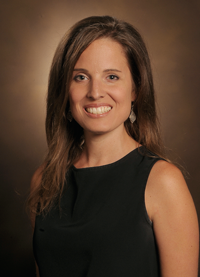Favorite Faculty: Beth Ann Yakes, M.D.

Beth Ann Yakes, M.D.
Medicine
In what ways do you work with medical students on campus? Which way is your favorite?
I am fortunate to be able to work with medical students in a number of different capacities – as an attending on the wards, a preceptor in clinic, a supervisor at Shade Tree, a supporter of student-led interest groups, and a lecturer on clinical clerkships. But my all-time favorite role with students is my College Mentor role. As one of two faculty leaders of Chapman College, I am privileged to mentor and teach a quarter of our amazing students. From one-on-one career counseling to small-group discussion-based learning to crazy community-building activities, I am privileged to connect with my students on both a professional and personal level. Over the last decade, I’ve enjoyed watching countless numbers of my students come in as bright yet unprepared learners who have worked tirelessly to gain the knowledge and experience that has allowed them to make a world-wide impact. We’ve shared laughs and tears, loss and joy, heartbreak and success along the way – but all of us (myself included) have grown in the process. I am a better physician and a better person because of what I’ve learned from my students and cannot imagine a better way to spend a day at work!
What was your favorite part of medical school?
When I think back to medical school at the University of Florida, what I remember most is the camaraderie. There we were 114 bright, committed, energetic young students preparing ourselves to change the world – and we knew we needed each other to make that happen. I remember late-night study groups, tailgating at the football games, sharing our embarrassing moments in physical diagnosis, nickel-beer night Tuesdays, intramural co-ed soccer games, Frosty-runs to Wendy’s, filling each other’s pockets with snacks on Surgery, and crying together when we lost our first patient. Medical school was where I truly learned that taking care of patients is an honor, and excellent patient care is best done in teams. Studying together, working together, and playing together prepared me to be the kind of doctor that my patients deserve and created lifelong friendships with folks who will always understand the joys and the burdens of carrying the badge of MD.
When you were in elementary school, what did think you were going to be when you grew up?
All of my life, I wanted to be a teacher. From playing "school" with the neighborhood kids in elementary school to tutoring my friends in high school chemistry, I knew exactly what type of work would leave me happy and fulfilled. What I didn’t know, was what kind of teacher I wanted to be – but with every step forward in my own education, I found the challenges and the joys of teaching just got better and better. As a college student with an interest in science, it just seemed to make sense to go to medical school so I could teach future doctors. I figured it didn’t get any more challenging than that! And where else could you find a more committed group of students than medical students? So I applied to medical school with the goal of doing exactly what I’m doing now – sharing my knowledge and experience in patient care with medical students who will go out and change the world. My elementary-school-self may not have known exactly what type of teacher I would become, but that passion for educating others and the fulfillment that comes in seeing the learner’s face light up with understanding hasn’t changed one bit.
What is the best piece of advice you have received during your training or medical career?
Growing up, my dad always said to me "To whom much is given, much is expected." That phrase challenged me to push myself to give a little extra, to serve a little harder, and to accomplish just a little more than what I thought was possible. Training has also taught me the value of the flip-side of that phrase. While much is expected of those of us who have been blessed with intelligence, stability, and opportunity in our lives, perhaps it is only fair to expect a little less from those who have followed a different path than mine. Giving my patients the grace to make mistakes and to fail to meet expectations has helped me develop the patience and perseverance needed to serve my patients, no matter what baggage is holding them down. I’ve also learned another important truth about that phrase – because while "much" is expected, not all is expected. I don’t have to be perfect, and experience has taught me that I cannot be perfect. But as long as I am giving as much as I can, then I can know that I’m making the best use of my talents and skills for the good of others.